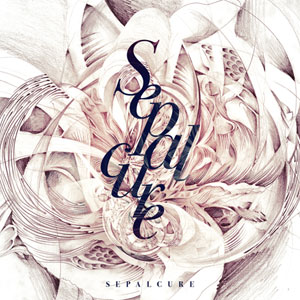Sepalcure Sepalcure
Even as the individual efforts of Travis Stewart (a.k.a. Machinedrum) and Praveen Sharma (a.k.a. Braille) […]

Even as the individual efforts of Travis Stewart (a.k.a. Machinedrum) and Praveen Sharma (a.k.a. Braille) continue to garner more attention and praise, the music produced by the pair’s collaborative project Sepalcure still arguably stands as the most stirring and vibrant tracks either artist has penned to date. Stewart’s and Sharma’s debut LP only continues to solidify this reputation, as they hunker down inside the depths of moody, UK-influenced bass music and present 10 impeccable tunes that unfold more and more brilliantly with each consecutive listen.
Admittedly, Sepalcure gets off to a bit of a slow start with “Me,” a dusty, soul-infused track that is solid enough on its own, but is ultimately outshined by virtually every other selection on the album. Fortunately, the Brooklyn duo steps into full stride with the LP’s next offering, “Pencil Pimp,” which exhibits the kind of juke-influenced drum programming Stewart displayed a prowess for on his most recent solo LP, Room(s), but wrangled in a bit, ready to fit the steady flow that defines much of the album. “Pencil Pimp” also marks the first of many examples of the duo’s expert talent for crafting rich, spacious textures. Whether it’s the skittering “Eternally Yrs,” the dub-house of “Yuh Nuh See,” or the half-step futurisms and R&B flavors of “Breezin,” each of Sepalcure‘s tracks feature heaps of incredibly warm—yet unobtrusive—low-end, along with no shortage of finely detailed drums and percussion that lay perfectly over the top of a deep, swirling bed of colossal pads, samples, and synth tones.
As Seplacure takes form, a consistent emotional ground that exists somewhere between stoney reminisce and melancholic introspection is reached. The beautifully pitched vocal snippets that appear on almost every track (and yet are by no means overdone) make for easy to identify markers in this landscape; phrases like “You are the one” and “Hold on, baby” stick out the most. Maybe these snapshots of language are meaningless to the producers who put them in place, but as a listener, they strike a chord that clearly resonates with the defining mood of the album’s aural aesthetic. To its credit, Sepalcure rarely leaves this state of mind, but rather has found access to a never-ending number of pockets hidden within this world of emotionally tinged, post-everything beats—effectively creating an album that feels naturally cohesive without a noticeable repetition of ideas.
Despite the slightly downtrodden feel that defines the LP, the dancefloor still seems like a primary focal point for Stewart and Sharma. Although tracks like “Pencil Pimp” and “Hold On” are certainly interesting enough to just sit and listen to, they would surely render themselves poignant in a club setting, too; the brooding bass and entrancing rhythmic patterns are powerful enough to move any crowd interested in forward-thinking bass music. Sure, there aren’t any “bangers” here, but Sepalcure has never been a project concerned with the obvious or the anthemic. Rather, the two producers have found their own sophisticated place within the complex world of contemporary electronic music by crafting a full-length that can satisfy headphone nerds and bass-hungry club-goers alike, without diluting the experience for either.

